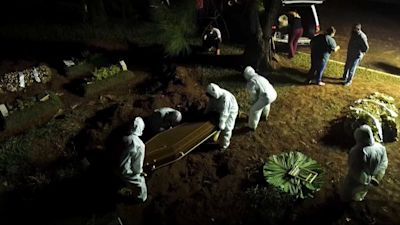Brazil faces Covid crisis as grave diggers work through the night to bury the dead

Video report by ITV News Correspondent Juliet Bremner and Production by Gustavo Basso
The Covid-19 crisis in Brazil has reached such an extent that grave diggers are having to work through the night in order to bury the dead.
On Tuesday, 3,870 people died of coronavirus, a new record for the South American country but there are fears in the coming weeks the number of fatalities could top 4,000 per day with no slow down in cases and deaths in sight.
There are fears a new variant, which is sweeping across Brazil, is contributing to this.
Known as P1, the new variant is thought to be 1.4 to 2.2 times more transmissible than other variants and there are also fears that young people are more likely to be infected with it and die from it.
One preliminary study found that deaths amongst people aged between 20 and 39 were 2.7 times higher than from other variants.
ITV News spent time on the Covid frontline in Brazil, with freelance journalist Gustavo Basso.
"The disease changed and who it affected changed too," Victor Chiavegato, manager of Santo Andres Field Hospitals in São Paulo told ITV News.
"When we look at this pavilion, the average age of the people here is 35-37 years old," he said, referring to the former sports hall which now serves as a ward.
And this is not a one-off case.
Brazil on track to suffer most deaths from Covid in the world as pandemic rages
Inside Brazil's Covid wards where patients are cared for in corridors by loved ones
Research published on Friday by the Oswaldo Cruz Foundation (Fiocruz), a research institute attached to Brazil’s Ministry of Health, found that Covid cases among people in their 30s, 40s, and 50s are up by 565%, 626%, and 525% respectively since the beginning of January.
The Brazilian Association of Intensive Care Medicine said that the number of 18-45 year olds requiring intensive care for coronavirus in February to March this year was three times greater than in September to November 2020, and coronavirus related deaths in that age group have almost doubled.
Maragareth Portela, a senior researcher at Fiocruz, told the British Medical Journal that "it is very likely that the P1 variant is more severe among young adults".
The P1 variant is thought to have emerged in Manaus, the capital of Brazil’s Amazonas region in November 2020, causing hospitals to collapse and moralities to soar, suggested it is more lethal.
In January, ITV News filmed inside hospitals in Manaus which were so overwhelmed by Covid patients, family members were caring for the sick and dying
A preliminary study, which compared case fatality rates in Manaus’s first wave of cases in April to May 2020 with the second wave in January 2021, found that deaths among people aged 20-39 were 2.7 times higher in the second wave than in the first.
In the general population they were only 1.15 times higher.
André Ricardo, epidemiologist at the Leopoldo Mandic School of Medicine in São Paulo and one of the study’s authors said: “P.1 appears to be more lethal among young men and women than the original strain.”
One of the reasons the country has struggled so much with the pandemic is due to resistance from the central government, led by President Jair Bolsanaro, over implementing lockdowns.
The president has argued lockdowns infringe on a person's right to earn a living and the economic cost is too high.
Due to the reluctance to lockdown nationally, regional leaders have moved to implement their own rules, but this has led to confusing situations as people move between borders with repeated cycles of opening and closing.
Also, the nation has fully vaccinated less than 2% of its citizens, which has been seen as a national embarrassment for a country that has had a good record of rolling out vaccines in the past.
Dr Jean Gorinchteyn, São Paulo Health Secretary, told ITV News: "We need vaccines. Until we get more vaccines, until everyone is vaccinated we will be dependent on people following the health and sanitary guidelines and wearing masks."
The World Health Organization has warned that unless infections are brought under control new, more dangerous variants could emerge - a threat to Brazil and neighbouring countries in South America.